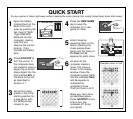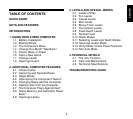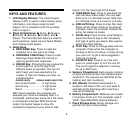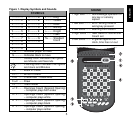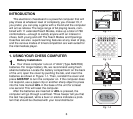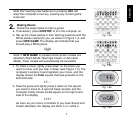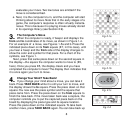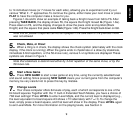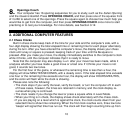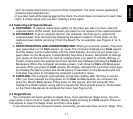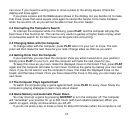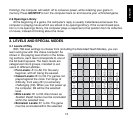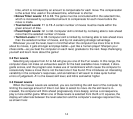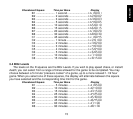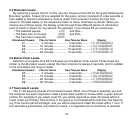
8
ዛዒዓዔዕዖዘዙዜ
ዑྠลྠฎྠลྠญዑ
ዐลྠลྠลྠลྠዐ
ዏྠลྠลྠลྠลዏ
ዎลྠลྠมฤลྠዎ
ውྠลྠลྠลྠลው
ዌลྠลྠลྠลྠዌ
ዋྠลྠลྠลྠลዋ
ዊลྠลྠลྠลྠዊ
ዝዒዓዔዕዖዘዙዞ
ዛዒዓዔዕዖዘዙዜ
ዑྠลྠฎྠลྠญዑ
ዐลྠลྠลྠลྠዐ
ዏྠลྠลฤลྠลዏ
ዎลྠลྠลྠลྠዎ
ውྠลྠลྠลྠลው
ዌลྠลྠลྠลྠዌ
ዋྠลྠลྠลྠลዋ
ዊลྠลྠลྠลྠዊ
ዝዒዓዔዕዖዘዙዞ
ዋྠลྠลྠลྠลዋ
ዊลྠลྠฎྠลธዊ
ዝዒዓዔዕዖዘዙዞ
Fig. 2-1a
Fig. 2-1b
Fig. 2-1c
Fig. 2-2
evaluates your move. Two low tones are emitted if the
move is considered bad.
e. Next, it is the computer’s turn, and the computer will start
thinking about its move. Note that in the early stages of a
game, the computer’s response is often virtually instanta-
neous. This is because it is playing moves already stored
in its openings library (see Section 2.9).
The Computer’s Move
3. When the computer is ready, it ‘beeps’ and displays the
from and to coordinates of its move, as shown in Figure 1-4.
For an example of a move, see Figures 1-5a and b. Press the
indicated piece down on its from square (E7, in this case), until
you hear a ‘beep’ and the from side of the display changes to
show the color and symbol for that piece. For a chart of the
symbols, see Figure 1.
Next, press that same piece down on the second square in
the display—the square the computer wants to move to (E5,
here). Once you press E5, the display clears and you have
completed the computer’s move! The display then indicates that
it is once again your turn to move.
Change Your Mind? Take Back!
4. If you change your mind about a move, you can take it
back. Press TAKE BACK while it is still your turn to move, and
the display shows the to square. Press the piece down on that
square. You now see the piece symbol and the square that
piece came from. Press the piece down on the from square to
finish the take-back. If the move taken back was a capture, the
computer reminds you to put the captured piece back on the
board by displaying the piece type and its square location.
Press this piece down on the indicated square. To take back
another move, press TAKE BACK again. You can take back up




